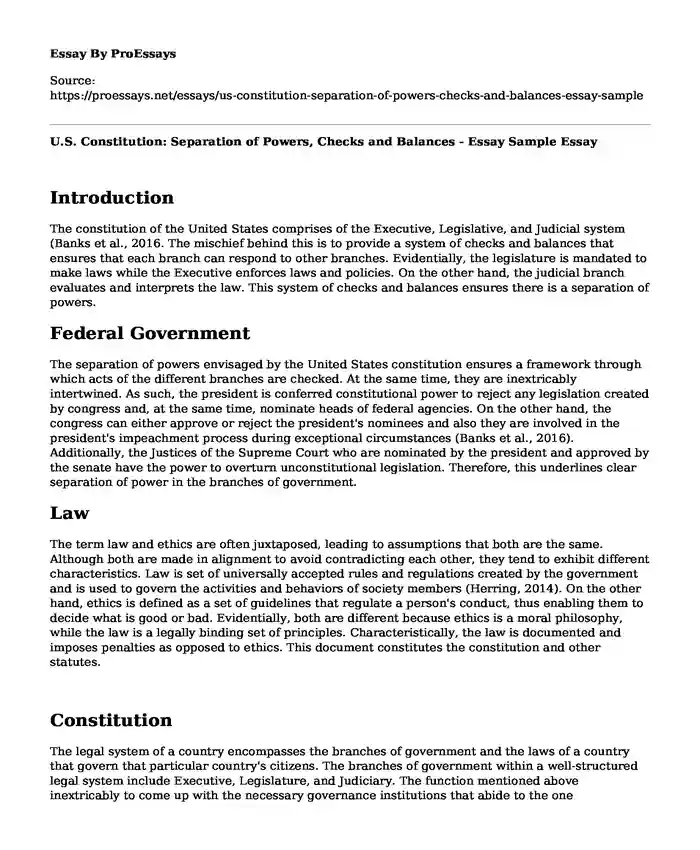Introduction
The constitution of the United States comprises of the Executive, Legislative, and Judicial system (Banks et al., 2016. The mischief behind this is to provide a system of checks and balances that ensures that each branch can respond to other branches. Evidentially, the legislature is mandated to make laws while the Executive enforces laws and policies. On the other hand, the judicial branch evaluates and interprets the law. This system of checks and balances ensures there is a separation of powers.
Federal Government
The separation of powers envisaged by the United States constitution ensures a framework through which acts of the different branches are checked. At the same time, they are inextricably intertwined. As such, the president is conferred constitutional power to reject any legislation created by congress and, at the same time, nominate heads of federal agencies. On the other hand, the congress can either approve or reject the president's nominees and also they are involved in the president's impeachment process during exceptional circumstances (Banks et al., 2016). Additionally, the Justices of the Supreme Court who are nominated by the president and approved by the senate have the power to overturn unconstitutional legislation. Therefore, this underlines clear separation of power in the branches of government.
Law
The term law and ethics are often juxtaposed, leading to assumptions that both are the same. Although both are made in alignment to avoid contradicting each other, they tend to exhibit different characteristics. Law is set of universally accepted rules and regulations created by the government and is used to govern the activities and behaviors of society members (Herring, 2014). On the other hand, ethics is defined as a set of guidelines that regulate a person's conduct, thus enabling them to decide what is good or bad. Evidentially, both are different because ethics is a moral philosophy, while the law is a legally binding set of principles. Characteristically, the law is documented and imposes penalties as opposed to ethics. This document constitutes the constitution and other statutes.
Constitution
The legal system of a country encompasses the branches of government and the laws of a country that govern that particular country's citizens. The branches of government within a well-structured legal system include Executive, Legislature, and Judiciary. The function mentioned above inextricably to come up with the necessary governance institutions that abide to the one constitution.
Court
Court decisions by judges form an integral part of creating case law, which is also known as common law. A principle called Stare decisis is established and abided by, once a court uses rulings from prior cases to arrive at a certain decision. However, the application of this principle is hierarchical. This implies that courts only ought to follow appellate courts; thus, the decisions of other courts are deemed persuasive rather than mandatory (Scalia, 2018). Further, the court ought to satisfy itself with the appropriate jurisdiction by establishing the subject matter and whether it is personal. This ultimately helps in enforcing the laws that are involved in the dispute.
Conclusion
The amicus brief strongly changed my mind based on the clarity of their explanation. This is because the issues raised by the amicus are well versed and further touch on the abuse of the legal system by the plaintiff. This is evidenced by the attack on the privilege of speech accorded to the media and, at the same time, filing for an injunction that restrains the media's freedom. The bottom line is that the case underscores the country's legal system, especially when it comes to media law.
References
Banks, D., Hendrix, J., Hickman, M., & Kyckelhahn, T. (2016). National Sources for Law Enforcement Employment Data. Washington, DC: US Department of Justice, Office of Justice Programs, Bureau of Justice Statistics.
Herring, J. (2014). Medical law and ethics. Oxford University Press, USA.
Scalia, A. (2018). A Matter of Interpretation: Federal Courts and the Law-New Edition (Vol. 47). Princeton University Press.
Cite this page
U.S. Constitution: Separation of Powers, Checks and Balances - Essay Sample. (2023, Nov 20). Retrieved from https://proessays.net/essays/us-constitution-separation-of-powers-checks-and-balances-essay-sample
If you are the original author of this essay and no longer wish to have it published on the ProEssays website, please click below to request its removal:
- The 5th Amendment Privilege Against Self-Incrimination - Essay Sample
- Research Paper on Fracturing Invasion: Threat to Democracy and Freedom
- Uncovering Atlanta's Darkest Secret: The Unsolved Murders of Black Children - Essay Sample
- Transnational Crimes: Effects Across Borders & Beyond - Research Paper
- Essay Example on Ernesto Miranda: When the U.S. Supreme Court Intervened
- Essay Example on Sleep Studies in Lab Setting: Problems & Solutions
- 74 People Selected in 82-Year History to Serve on Federal Reserve Board - Paper Example







